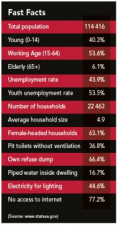
For the girls in Nkandla, the future is, for the most part, bleak and hopeless. They live in poverty, with limited or no access to electricity and water and are oppressed by cultural norms. Many are in arranged marriages and are passed from one poor household to another. A girl's value can be calculated at an estimated 11 cattle in lobola.
Their lives are a direct contradiction to the lavish lifestyle that President Zuma and his family enjoy in his nearby homestead. The property that received a R246 million upgrade (or R206 million, according to police commissioner Nathi Nhleko), and is complete with a fire pool, helipad, steam rooms, fireplaces and chandeliers.
However, despite the seemingly insurmountable challenges, including a lack of infrastructure and ingrained social conditioning, Siyafunda's community ICT programmes are doing what they can to empower these young women to try to help them create a new future for themselves.
Babalwa Dube, a Siyafunda community facilitator, rose to the challenge and moved to KwaZulu-Natal in 2013.
Thembisa-born and raised Dube, 28, is the facilitator of Siyafunda CTC (KZN), and is no stranger to the world of education and development. She studied business management at Ekhurhuleni West College and started her development career at Thembisa Self Help Association for the Disabled (TSHAD) in 2005. This is where Dube met Ahmed 'Smiley' Ismael from Siyafunda and left TSHAD to open community IT centres in Ivory Park and Klaafontein, where a need for IT literacy was identified.
Help is on the way
While working in Johannesburg, she noticed that several young women from KwaZulu-Natal all had similar stories to tell. These women had left their home towns because there were no facilities for them to learn ICT, but also because of the trauma they had experienced. "These girls had experienced poverty, violence and domestic abuse," Dube recalls.
In late 2013, Dube moved to Ulundi and started community ICT centres. In 2014, she approached the Nkandla municipality - the fifth poorest municipality in KwaZulu-Natal - with Intel's 'She will learn' basic ICT training programme.

In November 2014, the first group of women was trained at Nkandla municipality's library. The basic course, which lasts a week, requires students to attend for two hours a day. They learn Microsoft Word, Excel and PowerPoint. To date, 545 women between the ages of 17 and 35 have graduated from the programme. After completing this course, Siyafunda encourages them to attend the end-user computing programme, a three-month course that is a NQF3 national certificate. This course is gender-agnostic and, to date, 40 students have completed the programme. Of the 40 graduates, Dube is aware of only four who have found employment. Some of the graduates from this course are trained as facilitators to teach at the other community centres in the area. So far, 11 facilitators have been trained.
The introduction of the four community centres has brought to the foreground the cultural resistance to the advancement of women, as well as the pervasive oppression of women in the community. "There is one graduate who touches my heart," says Dube. "A lawyer wanted to hire her as a personal assistant, but her husband refused to let her work. She is still unemployed."
Dube is determined to open more training facilities and to use them to empower women in the area.
But then you see the sadness in their eyes. When I asked them, 'Why are you so sad?' they answer that they know this will never be a possibility.
Babalwa Dube
She believes that a successful community centre is not just about ICT, but about life skills as well. In nearby Ulundi, Dube ran workshops for women. She started each workshop by giving the attendees a piece of paper on which to write down a challenge they had faced. Dube was shocked. Of the members in her workshop, nearly 80 percent of the women told her they had been raped. She adds that every single woman in the group had experienced verbal and physical abuse, not just from their husbands but from the community as well.
Pregnant teenage girls are 'chased away from home', 'barren' women are shunned by their families as well as the community. "They're hurting a lot," says Dube. "In most cases, women hurt each other; they're not supporting each other."
But her experiences show that ICT skills development programmes in rural areas extend beyond the computer centre into the murky waters of tradition, stereotypes and social conditioning.
Perceptions
Dube believes the role of the ICT centres is to build confidence and self-worth among the women in the community. The introduction of the ICT centres also provides an opportunity for Dube to start life skills workshops and a women's club.
But this healing process is also about changing the women's perceptions of themselves. "Most of the girls in this group have been promised to men in arranged marriages," Dube says, adding that there is a perception that girls just want to get married, because it's seen as an opportunity to be taken care of. She says that if you ask the girls what they want to do, they say they'd like to be a doctor. "But then you see the sadness in their eyes. When I asked them, 'Why are you so sad?', they answer that they know this will never be a possibility."
Another challenge Dube faces is how social conditioning has been internalised. Dube gets resistance from the female facilitators who don't believe they're capable of doing their job. "You have to break the message through, or force it so they end up believing it. I have to say to them, 'You have to believe the thing we've seen in you', so they can start believing they're worth it. With some you'll see their smile and the way they walk will change."
Dube's approach is that every girl is worth the effort and she 'wants to do more'. She is determined that her efforts will be of benefit to the women in the community by effecting social change through ICT.
The current state of affairs
While President Zuma and his extended family live in the lap of luxury, an opulent homestead where members of the family are flown in and enjoy the finest life has to offer, the surrounding community is scratching through the dirt to try to survive.
"There is a cry from the community about how President Zuma has spent millions to live in luxury while they are in poverty, says Mzothini Mkhize, the senior programmes officer at Nkandla.
Mkhize paints a dismal picture of life for the community, which relies almost completely on subsistence farming and has limited or no access to water and electricity. "There is a high rate of poverty," he says, illustrating that the unemployment rate is 43.9 percent, and 57 percent of the population survives on social grants.
The population in the area is on the decrease. "In 2004, the population of Nkandla was 330 000," he says, but it has dropped to 114 000.
"Maybe by the next census, it will be lower than this," he says. While it's highly likely that many members of the community have moved to urban areas for employment, he has a suspicion that much of the decline can be attributed to HIV/Aids.

Crime is also on the increase. Mkhize says there's an increase in drug abuse among the unemployed youth, mainly alcohol and dagga, and this has led to an increase in stock theft and minor crime. "Stock are the only assets we have, our cows, sheep and goats," he says. "But I've got seven daughters." Lobola for each daughter is 11 cows, so Mkhize will be 77 cows richer when they marry.
While the education system is producing strong maths and science graduates, it is battling. "There is no ward without a pre-primary, primary and highschool," he says. "But the infrastructure isn't good, and we are short of science labs." As for ICT, most students haven't even seen a computer. "It's a challenge," he says.
An FET College that will be offering technology and administration courses is currently being built, but employment opportunities after studying will be scarce. "They have to leave Nkandla to go work. We have no factories or industry here. Most of the jobs are government jobs," he says. The road infrastructure is also poor, which inhibits economic development.
Other than public sector positions, the pine tree plantations and Nkandla's tea (which is a favourite in London), the opportunities for a better life for Nkandla's community are not looking hopeful.
This article was first published in Brainstorm magazine. Click here to read the complete article at the Brainstorm website.
Share